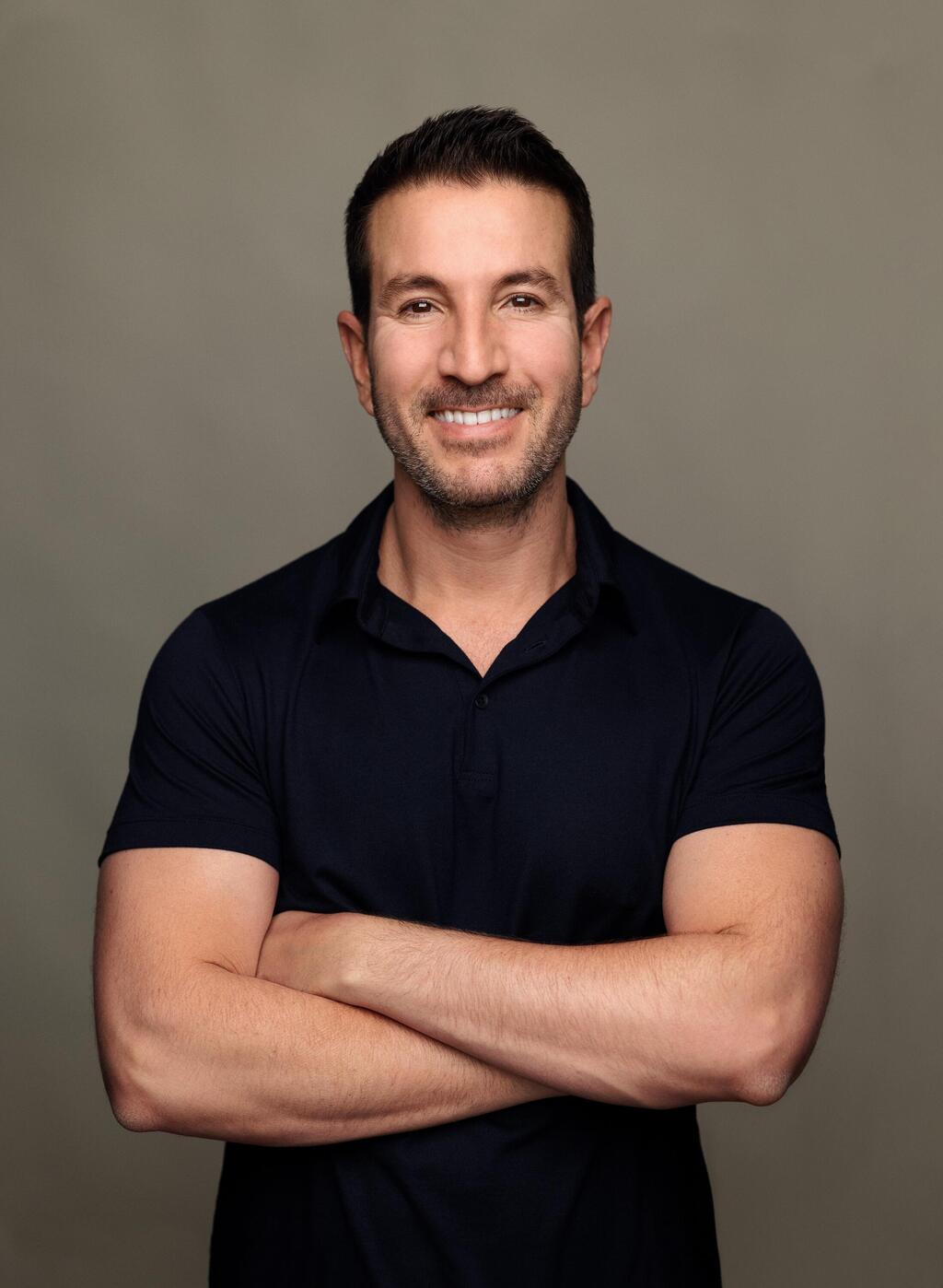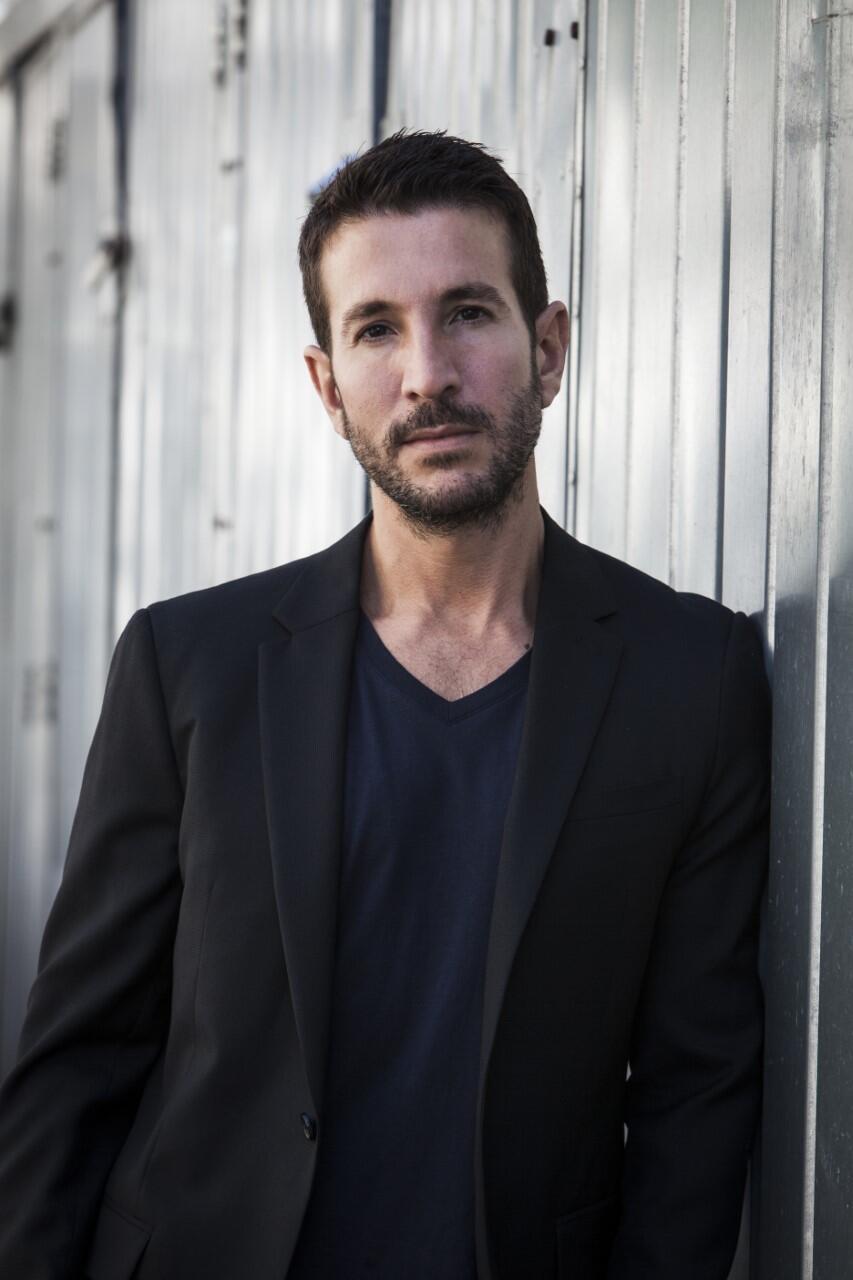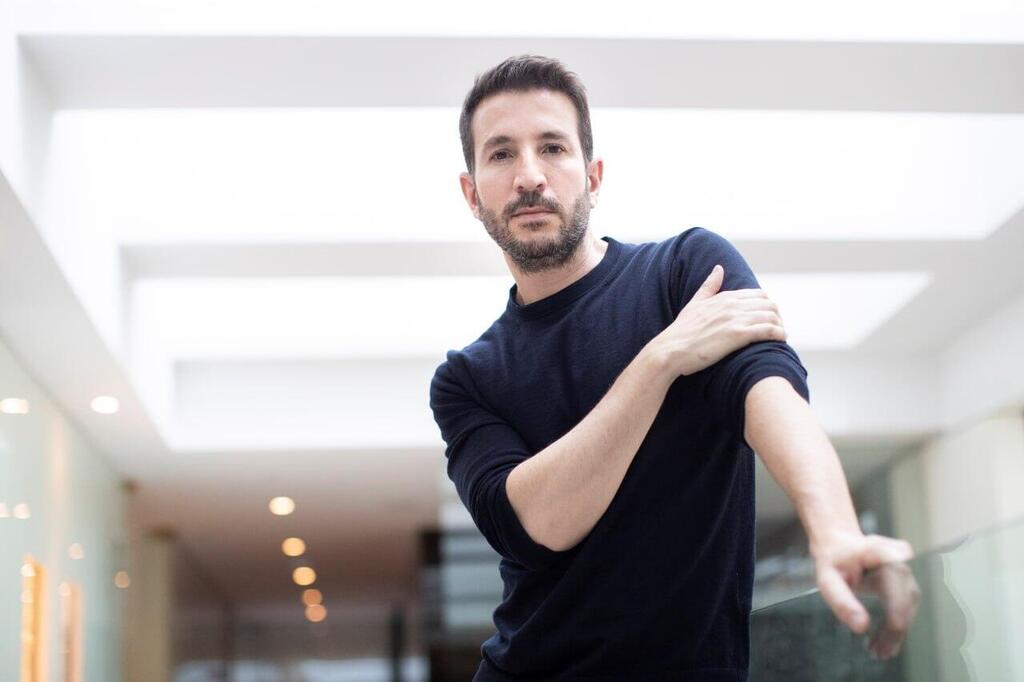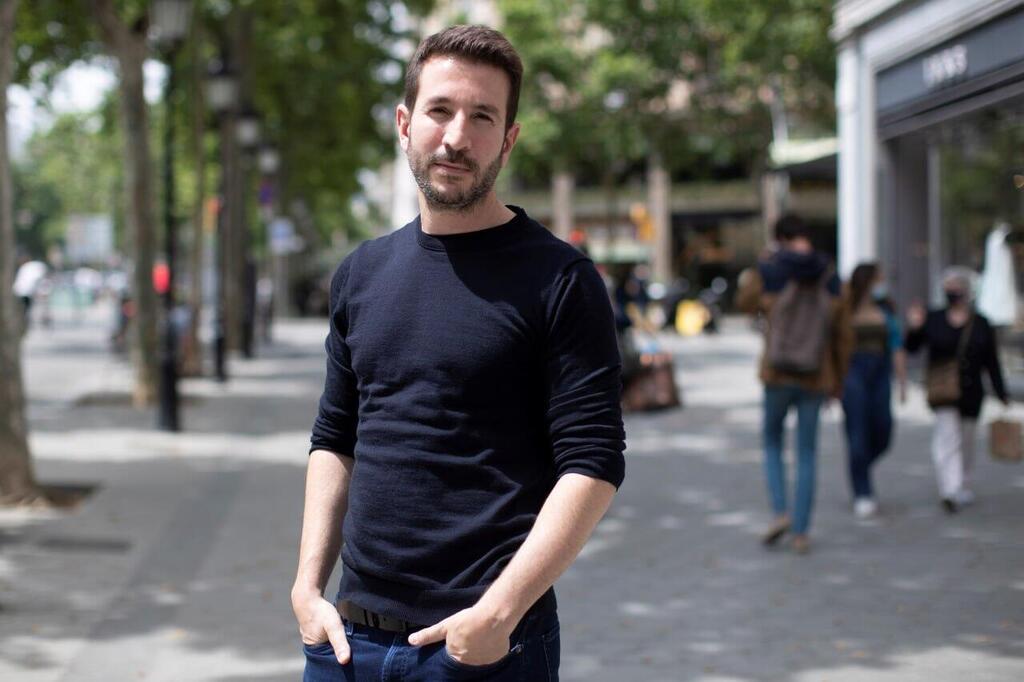Getting your Trinity Audio player ready...
Twenty-five years ago, the writer Alex Michaelides, born in Cyprus, got stuck on the island of Nicosia. The winds on the island were so strong that boats could not approach or sail away from it, and for Michaelides and the other people on the island, there was no choice but to wait for nature to calm down and access to the island to renew. Already then, he says, he thought to himself that this was an excellent way to make people stay together in one place, even if they longed to leave.
It took two decades, ten years of psychotherapy, a career sampling Hollywood scripts, working in an at-risk youth institution and writing two bestsellers before this idea found its way onto paper. This happened in his latest thriller, The Fury, which was recently released in Israel. In this book, his characters - two successful actresses, a playwright, a failed businessman and several service people - go on vacation on a Greek island, get caught up in a situation that leads to murder and are forced to deal with it without outside intervention until calmer winds end their forced isolation. Along the way, Michaelides delves, as usual, into the wounded souls of his characters, providing psychological connections to their personalities and going back to their childhoods to complete the picture. Agatha Christie, a writer admired by Michaelides, meets When Nietzsche Wept.
"I'm always very fascinated in looking at the childhood of all of my characters," he admitted. "Somebody asked me once how I get ideas and if I look through headlines of newspapers, trying to look for juicy crimes, and that doesn't really interest me. I'm much more interested in the psychology of what makes somebody transform from being a fairly normal person to a person who's capable of something as terrible as murder."
"Since I have a background in psychotherapy, my feeling is that the sources of this behavior are found in childhood. So in The Fury, I wrote several pages about the childhood of each character, just so I understood where they were coming from. I didn't include any of that in the book because I felt that it wasn't important that the reader knows it, but it was important that I knew it; if that makes sense. So their actions were truthful and honest and came from a place of reality. I think the reader can intuit that from the writing itself."
Do you expect the reader to infer something about themselves?
"I hope so. I think the greatest kind of novels that I love are books that aren't just crying stories but are stories that somehow touch you in a place that's a bit deeper. What I wanted to do when I first started to write was marry Agatha Christie's plotting with a kind of deeper psychological complexity. And when I read novels, if I'm not interested in just a twist for a twist's sake, I'm looking for something that's going to interest me psychologically and hopefully move me emotionally as well."
"I think all people who go into show business are damaged on some level, because I think that they're seeking validation, approval, applause, all of these things that have something to do with feeling unloved and unworthy in their childhood"
Michaelides' works were not always closely related to the psychology of his characters. His scripts, including for big-budget Hollywood films like The Con Is On or Red, White & Royal Blue starring Uma Thurman and Steven Frey were, according to him, shallow and empty. "I think I always had a good talent for plots, but everything I wrote was very shallow and empty. And then finally, once I started to access depth in myself, my writing also became deeper and that became my interest in psychology."
The youngest son of a mixed family, with a Cypriot father and a British mother, Michaelides struggled to find himself in Cypriot society. "I'm quite neurotic still. I found it hard to fit in and when I was young, I just wanted to read books and watch movies. And my mom would always encourage me to get off my bicycle and go make friends. And I wasn't very good at that. I much preferred to be by myself which led me to my career really. I was obsessed with films and I thought if I can just get to Hollywood I'll be happy," he said.
How did you deal with the different mentalities in Cyprus and England?
"Well, it interests me. I think I'm definitely going to perhaps write about it for my next book. I think there's a real conflict that comes from growing up in a multi-racial family. So my mother is very English and my father is very Greek. And there's always been a lot of conflict in the house about food. I think it's probably similar for anybody who grows up a bit like that. It's a different temperament, colder versus more passionate and hot-headed. So it's interesting. I'd like to explore it more but I think I've been influenced by both very much.
"My mom introduced me to books and reading and she has so many books in the house and I think without her, I probably wouldn't have become a writer. But my father, of Greek heritage, has been a huge influence on me with Greek mythology and tragedy.
Did you find a way to explain to yourself why you felt so lonely or didn't belong?
"Cyprus is a very outdoorsy place; it's very sporty and everyone's outside all the time. I'm much more into books and reading, so I found it quite hard to fit in. Just to give you a small example, I think I was probably the first person at my school to study English literature at a university. Everyone did mathematics or medicine or law. Those were the options. And so it was always slightly being artistic, I suppose, as more than intellectual."
When he was 18, Michaelides took his ambitions and his foreign passport and moved to England, where he began studying English literature at Cambridge. He later took another step toward realizing his Hollywood dream and studied screenwriting in Los Angeles. He began working in the entertainment industry but was disappointed. The conclusion was that there was no choice, he would have to stop looking for solutions outside and start looking inside.
"I think all people who go into show business are on some level quite damaged, because I think that they're seeking validation, approval, applause, all of these things have something to do with feeling unloved and unworthy in their childhood. I think all of these characters, particularly in The Fury are kind of wounded. Children. That's where I was coming from. Only when I really embarked on 10 years of therapy and then studying it and then working particularly with young people, I think that changed me the most."
Michaelides abandoned Hollywood, returned to London, and began the long and arduous journey of psychotherapy treatments. After ten years of treatment and studies that qualified him as a group therapist, he began working at a psychiatric clinic in London that focused on youth at risk. "It was the most rewarding thing I've ever done. And it was a great psychiatric clinic. It was a therapeutic community and it got shut down after 40 years in London because of financial cuts. And it was so sad. It was devastating. And if it hadn't been shut down, I'm pretty sure I would still be there because it was a wonderful environment and the kids were amazing and they'd come from really hard starts in life."
Don't you think you could have been a good therapist?
"No, I'm too selfish to start with. I'm also a writer, so I began studying psychotherapy and worked in a secure unit for teenagers. And then ultimately I left. I left for a variety of reasons, but the main reason was that I wasn't a therapist, I was a writer, and I knew that in my heart. So somehow it felt fraudulent to start taking on patients when my heart wasn't in it. I think I went about as far as I could go with therapy because the presumption that somehow it can heal your life is incorrect."
Michaelides released his second book The Maidens less than two years after The Silent Patient. Its plot takes place at Cambridge University and its protagonist is a group therapist dealing with grief over the death of her husband. It was written during the COVID lockdowns, when Michalides was locked in his home for a year in gray London and felt quite miserable. "I didn't really enjoy writing The Maidens, but that was again, partly because the subject matter I chose was very dark and a grieving heroine. It was very sad. I thought I wanted to try and have some fun next time."
The success of his first book, The Silent Patient, certainly came as a surprise to Michaelides. It was his first attempt at writing a novel since he began therapy, and his goal was to take an Agatha Christie-esque detective story and turn it into a more psychologically complex novel, with characters more like real people. Despite low expectations, The Silent Patient became a New York Times bestseller and Amazon's number-one thriller of 2019. The book was even considered by Brad Pitt's production company for a movie.
You wrote The Maidens, pretty quickly after The Silent Patient, was it external pressure or internal impulse?
"Well, that's funny. It was my agent, actually, Sam. When I wrote The Silent Patient, I didn't have an agent. I had been dropped by my last agent. I wasn't really expecting the book to get published so its success took me aback. And then my new agent, Sam, said, 'you're going to have to write a second book at some point. It might as well be now.' And so I'm grateful in a way because I think if I hadn't immediately started writing, it would have been put off even more."
Some people say "bring the third child first."
"It is a bit like children. It's funny because people always ask me, which is my favorite of the books I've written so far. And I think of it being like children, you can't come up with an answer, particularly in public, about which child you prefer the most."
How is The Fury different from The Maidens?
"It was very different from my first two. Again, partly because I just thought I didn't really enjoy writing The Maidens, but that was again, partly because the subject matter I chose was very dark and a grieving heroine. It was very sad and after spending three years writing that book, I felt quite depressed at the end of it."
I know you are a fan of Greek mythology and incorporating it in your books, but in this book, you returned to Cyprus.
"I always start with the location. And so with the first novel I started, when I was working in a psychiatric unit, I thought, 'oh, this would be a great place to set the mystery.' I knew that world well, and I thought I could bring it to life well.
And then with the second novel, I thought, 'oh, Cambridge College is a good place to set a mystery.' Largely because I just taught myself to write these books with a biography through Agatha Christie, and so she always has an enclosed location. So it's important that characters can't just get up and walk off. I like the first two locations I chose because Agatha Christie didn't write anything in a psychiatric unit and she didn't set anything in a Cambridge college because I think she didn't go to university."
When you write a book, is the screenwriter in you already thinking about how to adapt it into a screenplay?
"That's an interesting question. I try to write them as books. I mean, I think The Fury was always going to be a film unlike the first two because I wrote it for my friend, Uma Thurman, the actress. She was a great help when I was writing this adaptation and she's always inspired me very much."
"She taught me a lot about how to write. Because she knows how to tell a story visually. She gave me a lot of good ideas for The Silent Patient. I thought 'one day, I'm going to write something for Uma.' And so I wrote the part of Lana for her so initially it was meant to be just a paragraph long."
Are you married? Do you have kids?
"I'm not in a relationship. I'm not married. I don't have kids. I'm just a private person who likes to write books and spend a lot of time on my own. It's harder as well as you get older to meet people.
"I had much more of a life until I sold The Silent Patient, and from then on, life has been a bit of a whirlwind, a lot of traveling, and a lot of work, and I feel in a way that I would like to slow down a little bit, because this pace has meant that I've lost touch with not just relationships, but also with friends and everything."
Sometimes it's tiring to be around people.
"I realized it when I was on tour in America. I thought I would enjoy it more than I did and I didn't enjoy it very much because I was longing to get back to my flat to be on my own again. I'm looking forward to writing my next book now because I know that there's a wild park in Nicosia where I can walk in the mornings by myself, think, and then come back and write in the afternoon. Then I cook myself a meal and it's a very isolated world and I was like that when I was a child too.
"I was always wanting to be alone and be in my imagination. So maybe you're right, it's a character thing and I think it suits being a writer very well. It doesn't suit other aspects of life terribly. Sometimes interaction with people just sucks too much energy."
Have you ever been to Israel?
"You know what, it's shameful because you're so close to Cyprus and I haven't been. I intend to, I nearly went to the Jerusalem Festival once or twice, but the timing didn't work out. I intended to go this year and I overstretched myself with traveling. I'm traveling nonstop, but as soon as the date works out, I will definitely come and visit. I've always been told that Israeli people are quite interested in psychotherapy as well."





